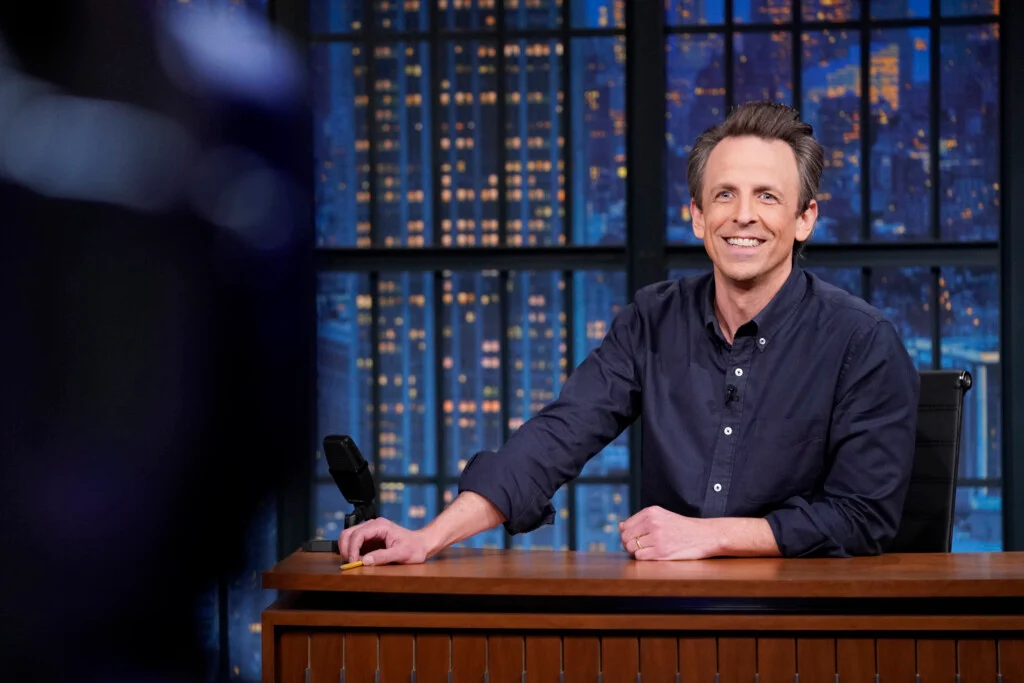‘Late Night’ host
Seth Meyers

‘Late Night’ host Seth Myers returns to New Hampshire for a Nov. 4 benefit show at SNHU Arena to fundraise for CASA NH and the Granite State Children’s Alliance. After a five-month shutdown, Seth Meyers returned to late night TV Oct. 2 after the striking Writers Guild of America brokered a deal with the Alliance of Motion Picture and Television Producers.
The “Saturday Night Live” veteran and host of “Late Night with Seth Meyers” spent part of the layover appearing on “Strike Force Five,” a podcast with Jimmy Kimmel, Jimmy Fallon, Stephen Colbert and John Oliver that raised money to help the striking writers.
The Manchester West High School alumnus returns to the Granite State Nov. 4 to perform a benefit concert at SNHU Arena for Court Appointed Special Advocates of New Hampshire and the Granite State Children’s Alliance. (Visit casanh.org/seth-meyers for ticket info.)
We talked to Meyers in late September shortly before the strike was resolved.
Q. On your “Strike Force Five” podcast with your fellow late night take show hosts, you all seemed to give each other room, without talking over each other. Had you ever gathered with all of those guys before in any way?
A. Only just with the unrecorded Zooms we were doing in the run-up to the writers’ strike and then a month after it started. It was really nice and useful to be on that same page with your colleagues at a time like that. We had joked about those early ones that we should record it, and I don’t think any of us actually took it seriously. Credit to Jimmy Kimmel, who sort of pulled together the idea of doing the podcast as a fundraiser.
Q. You’re doing this podcast to raise money for your writers while they are on strike. As someone who had a long tenure as head writer at “Saturday Night Live,” what do you see as the most important issues at stake for them?
A. A thing I said even on the air right before we went on strike is, look, nobody is entitled to a job in show business. But for those who do have a job, it has to be a living wage, and there has to be a means forward to make a career out of it. I think show business would suffer if it became a gig economy.
You want people to get in. And not only continue to learn from people who are senior to them, but then to be able to pass on that education to the next generation of writers. And that’s how it’s always worked. And that’s why we have such robust television and film.
Q. Stephen Colbert compared the unexpected vacation to getting a colonoscopy. What do you miss the most right now from not being able to do “Late Night”?
A. It’s just so nice to go into an office and be surrounded by people who make you laugh. It has been wonderful to spend extra time with my family, but my kids just aren’t old enough to have insightful commentary on current events. They make me laugh. They just don’t make me think.
Q. You’ve been spending more time at home. Are your sons and daughter wondering why they see you hanging around so much?
A. I think the heartbreaking thing is we realize they had no idea that there was even a strike. But they are pretty happy to have me around. And ultimately, I tried to do a fair amount of standup during the time off. And the great thing for me in standup is the more time you spend with your kids, the more material they give you. It’s been a very nice trade off. I give them dad time, and they give me jokes.
Q. Did you learn anything from working through the pandemic that will help your team get back to work faster once the strike ends?
A. I only hope that because of how nimble we had to be during COVID, that everybody will come back and hit the ground running. But don’t get me wrong, COVID was a far worse reason to be off than the writers’ strike.
I don’t have to explain why that was a more tragic time, but we did get to do the show through it.
Q. Have you ever had a guest scheduled that drove you to distraction beforehand?
A. I get caught by everyone in my family talking to myself. Constantly. I am always thinking about the next time I have to perform or, yes, the next time I have to interview somebody. I would say the ones where I was most likely doing that in the last few years would be Bruce Springsteen and David Letterman. Those were two people where I was very aware of the fact that they were sort of in my future as a guest that I would have to have a conversation with.
The thing that makes it hard is you know they don’t want to spend 10 minutes having you tell them how great they are. And what they really want to do is have a good conversation.
You have to kind of remind yourself that even though it’s crazy that you’re not spending the whole time telling them how they changed your life, you got to be a little bit better than that.